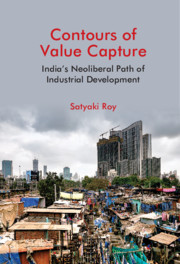Book contents
- Frontmatter
- Dedication
- Contents
- Tables and Figures
- Preface
- 1 introduction
- 2 Manufacturing versus Services: A Misplaced Debate
- 3 Global Production Network: India and Developing Countries
- 4 Financialisation in India: Emerging Trends in the Corporate Sector
- 5 Hierarchies of Capital and the Architecture of Value Capture
- 6 Informality: Regime of Accumulation and Discourse of Power
- 7 Self-Employment as Disguised Dispossession
- 8 Land Acquisition in India: Revisiting Primitive Accumulation
- 9 Decoding Resistance and Class Formation in the Neoliberal Regime
- 10 Conclusion
- References
- Index
8 - Land Acquisition in India: Revisiting Primitive Accumulation
Published online by Cambridge University Press: 26 March 2020
- Frontmatter
- Dedication
- Contents
- Tables and Figures
- Preface
- 1 introduction
- 2 Manufacturing versus Services: A Misplaced Debate
- 3 Global Production Network: India and Developing Countries
- 4 Financialisation in India: Emerging Trends in the Corporate Sector
- 5 Hierarchies of Capital and the Architecture of Value Capture
- 6 Informality: Regime of Accumulation and Discourse of Power
- 7 Self-Employment as Disguised Dispossession
- 8 Land Acquisition in India: Revisiting Primitive Accumulation
- 9 Decoding Resistance and Class Formation in the Neoliberal Regime
- 10 Conclusion
- References
- Index
Summary
The splurge of land grab across the world in the backdrop of financial crisis, rising food and energy prices and in India, particularly since 2005, several issues related to acquisition of farm land and consequent dispossession caused a huge furore and public debate. The primary concern expressed in the World Bank reports of 2008 and 2010 was that poverty alleviation needs to be linked to reducing ‘yield gap’ in agriculture and the necessary transformation of generating productive employment at least for the rural population has to be mediated by large land holdings engaging in commercial agriculture. Investment on land also became important due to a rise in food and energy prices and large capital investment moved on to acquire land to ensure food and energy security for the future. Apart from these stated goals of ‘rational planning’ in using resources of the planet, the discourses in favour of acquiring farm land for more productive use largely revolves on the modernist logic of transforming agricultural land either from small-holding, subsistence agriculture to agribusiness linked to the new commodity regime or to provide spaces for industry that would evict unproductive rural labour and employ them in more productive activities. Essentially, both these rationales invoke a teleology or an imagery of linear progress which is more or less decided by the past of advanced capitalist countries.
The Lewis–Kuznets process of moving people out of agriculture, the classical trajectory of modernity where people of labour-surplus countries need to be pushed out from traditional low-productivity segments to high-productivity industry and service activities is the underlying teleology broadly invoked in these discourses. Because of surplus labour, real wage remains more or less the same, despite labour being drawn in more productive activities and the rising gap between wage and productivity becomes the source of capital accumulation in modern sectors. The process of accumulation in the modern sector will pull more labour from low-productive agricultural activity and absorb them in high-productive segments, eventually leading to an exhaustion of surplus labour which will cause rise in wages. This path of ‘modernity’ from ‘backward’ agriculture was conceived in a classical setting when demand was not thought of as a problem and technological growth was supposed to engage more people through its direct and indirect effects rather than causing a scenario of net redundancy of labour.
- Type
- Chapter
- Information
- Contours of Value CaptureIndia's Neoliberal Path of Industrial Development, pp. 134 - 154Publisher: Cambridge University PressPrint publication year: 2020



